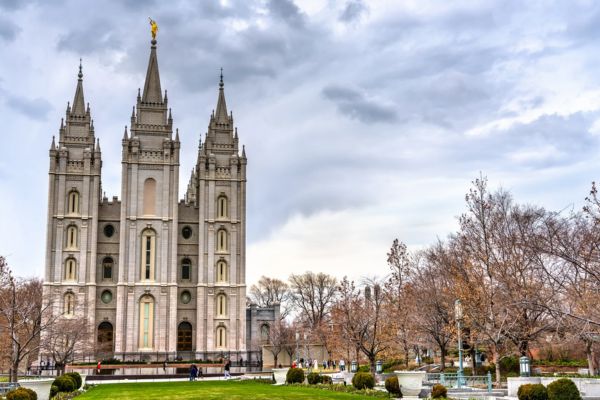The Church of Jesus Christ of Latter-day Saints (LDS Church) is known for its strong emphasis on financial self-reliance and prudent money management. While the church itself doesn’t directly offer loans in the traditional sense, there are various financial assistance programs and resources available to members in need. This comprehensive guide will explore the concept of LDS Church loans, the alternatives provided by the church, and how members can access financial support when facing challenging circumstances.
Understanding LDS Church Financial Philosophy
Self-Reliance and Financial Independence
The LDS Church strongly encourages its members to achieve financial independence and self-reliance. This principle is deeply rooted in the church’s teachings and is considered an essential aspect of spiritual and temporal well-being. The church provides numerous resources and programs to help members develop financial literacy, create budgets, and manage their finances effectively.
The Law of Tithing and Fast Offerings
Central to the LDS financial system are the principles of tithing and fast offerings. Tithing involves members donating 10% of their income to the church, while fast offerings are additional voluntary donations made by members who fast (abstain from food and drink) for two consecutive meals each month. These contributions form the backbone of the church’s welfare system and financial assistance programs.
LDS Church Financial Assistance Programs
While the LDS Church doesn’t offer traditional loans, it does provide various forms of financial assistance to members in need. These programs are designed to help individuals and families overcome temporary financial difficulties and work towards long-term self-reliance.
-
Bishop’s Storehouse
The Bishop’s Storehouse is a key component of the LDS Church’s welfare system. It provides food and other essential goods to members facing financial hardship. Access to the storehouse is granted through a recommendation from the local bishop or branch president after assessing the individual’s or family’s needs.
-
Fast Offering Assistance
Fast-offering funds, collected from member donations, can be used to provide temporary financial assistance to those in need. This assistance may cover essential expenses such as rent, utilities, or medical bills. The local bishop has the authority to approve the use of these funds based on individual circumstances.
-
Perpetual Education Fund
The Perpetual Education Fund (PEF) is a program designed to help members in developing countries obtain education and vocational training. While not a traditional loan, it provides financial support for education-related expenses, which recipients are expected to repay over time as their earning potential increases.
-
Deseret Industries
Deseret Industries, a nonprofit organization operated by the LDS Church, provides job training and employment opportunities for individuals facing barriers to employment. While not a direct financial assistance program, it helps members develop skills and find stable employment, contributing to long-term financial stability.
Accessing LDS Church Financial Assistance
The Role of the Bishop
In the LDS Church, the local bishop plays a crucial role in assessing and approving financial assistance requests. Members seeking help should first consult with their bishop, who will evaluate their situation and determine the most appropriate form of assistance.
Self-Reliance Services
The church offers Self-Reliance Services, which include workshops and courses on topics such as personal finance, starting a business, and finding better employment. These resources are designed to help members develop skills and knowledge to improve their financial situation independently.
Welfare and Self-Reliance Specialists
Many LDS stakes (groups of congregations) have welfare and self-reliance specialists who can guide on financial matters, job searches, and accessing church resources. These individuals can be valuable sources of information and support for members seeking to improve their financial situation.
Alternative Financial Resources for LDS Members
While the LDS Church provides various forms of assistance, members may also explore other financial options when facing monetary challenges.
Credit Unions
Some areas have credit unions associated with the LDS community, such as the LDS First Credit Union in Utah. While not directly affiliated with the church, these institutions may offer financial products and services tailored to the needs of LDS members.
Debt Consolidation and Financial Counseling
Members struggling with debt may benefit from debt consolidation services or financial counseling. The church encourages members to seek professional advice when dealing with complex financial situations.
Community Resources
Local government agencies and nonprofit organizations often provide financial assistance programs that LDS members can access in addition to church resources. These may include housing assistance, food banks, and job training programs.
Financial Self-Reliance Principles in LDS Teachings
Provident Living
The concept of provident living is central to LDS financial teachings. It emphasizes wise resource management, frugality, and preparedness for future challenges. Members are encouraged to live within their means, avoid unnecessary debt, and build emergency savings.
Debt Avoidance
The LDS Church strongly advises members to avoid unnecessary debt and to work towards becoming debt-free. This principle aligns with the church’s emphasis on financial independence and self-reliance.
Education and Skill Development
Continuous learning and skill development are highly valued in LDS culture. Members are encouraged to pursue education and training opportunities to enhance their earning potential and achieve greater financial stability.
The Impact of LDS Financial Principles on Members’ Lives
Building Financial Resilience
By following LDS financial principles, many members have been able to build emergency funds, avoid excessive debt, and weather financial storms more effectively. This resilience not only benefits individuals and families but also strengthens the entire LDS community.
Generational Impact
As LDS members implement sound financial practices and teach these principles to their children, the impact of financial self-reliance extends across generations. This creates a cycle of financial stability and independence within LDS families and communities.
Community Support and Service
Financial self-reliance enables LDS members to not only care for their own needs but also to contribute more effectively to their communities and church programs. This aligns with the LDS principle of service and caring for others in need.
Challenges and Criticisms
Limited Direct Financial Assistance
Some critics argue that the LDS Church’s approach to financial assistance, which emphasizes self-reliance and temporary aid, may not adequately address long-term or systemic financial challenges faced by members.
Cultural Expectations
The strong emphasis on financial self-reliance within LDS culture can sometimes create pressure or stigma for those who need to seek assistance. Church leaders and members need to balance the principles of self-reliance with compassion and understanding for those facing financial difficulties.
Global Economic Disparities
The effectiveness of LDS financial principles and assistance programs may vary depending on local economic conditions. Members in developing countries or areas with limited economic opportunities may face greater challenges in achieving financial self-reliance.
Future Trends in LDS Financial Assistance
Technology Integration
As technology continues to advance, the LDS Church may explore digital platforms for financial education, budgeting tools, and resource allocation to better serve members’ needs.
Expanded Educational Programs
The success of programs like the Perpetual Education Fund may lead to expanded educational initiatives, potentially including online learning opportunities and partnerships with educational institutions.
Increased Focus on Entrepreneurship
Given the church’s emphasis on self-reliance, there may be a growing focus on supporting members in developing entrepreneurial skills and starting small businesses as a path to financial stability.
Conclusion
While the LDS Church does not offer traditional loans, its comprehensive approach to financial well-being provides members with various forms of assistance and resources to achieve self-reliance. From temporary aid through fast offerings to long-term educational support via the Perpetual Education Fund, the church strives to help its members navigate financial challenges while adhering to principles of provident living and personal responsibility.
By combining financial assistance programs with educational resources and a strong emphasis on self-reliance, the LDS Church aims to empower its members to achieve lasting financial stability. This approach not only benefits individual members and families but also strengthens the entire LDS community and enables greater service and contribution to society at large.
As economic landscapes continue to evolve, the LDS Church’s financial assistance programs and teachings will likely adapt to meet the changing needs of its global membership. The enduring principles of self-reliance, prudent financial management, and community support will continue to guide LDS members in their pursuit of financial well-being and spiritual growth.
Frequently Asked Questions
Q: Does the LDS Church offer personal loans to members?
A: The LDS Church does not offer traditional personal loans. Instead, it provides various forms of financial assistance through programs like fast offering funds and the Bishop’s Storehouse for members facing temporary financial difficulties.
Q: How can LDS members access financial assistance from the church?
A: Members seeking financial assistance should first consult with their local bishop or branch president. The bishop will assess the situation and may provide aid through fast-offering funds, access to the Bishop’s Storehouse, or referrals to other church resources.
Q: What is the Perpetual Education Fund, and how does it work?
A: The Perpetual Education Fund (PEF) is a program that provides financial assistance for education and vocational training to LDS members in developing countries. Recipients receive funds for education-related expenses and are expected to repay the fund over time as their earning potential increases.
Q: Are there any LDS-affiliated financial institutions that offer loans?
A: While not directly affiliated with the church, some credit unions, such as the LDS First Credit Union in Utah, cater to the LDS community and may offer financial products tailored to members’ needs.
Q: How does the LDS Church’s emphasis on self-reliance affect its approach to financial assistance?
A: The church’s focus on self-reliance means that financial assistance is typically temporary and accompanied by resources to help members improve their long-term financial situation, such as budgeting classes and job search assistance.
Q: Can non-LDS individuals access financial assistance from the church?
A: While the church’s primary focus is on assisting its members, local bishops may sometimes provide limited assistance to non-members in dire need, particularly through programs like the Bishop’s Storehouse.
Q: What financial education resources does the LDS Church offer to its members?
A: The church provides various financial education resources, including Self-Reliance Services workshops, courses on personal finance, and materials on budgeting, debt reduction, and provident living principles.
Q: How does tithing relate to the LDS Church’s financial assistance programs?
A: Tithing contributions support the church’s overall operations, including its welfare system. However, fast offerings—separate from tithing—are the primary source of funds used for direct financial assistance to members in need.







Leave a Comment